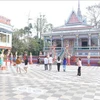Linh Ung Pagoda is located in an area known locally as Bai But or Buddha’s Sanctuary on Son Tra peninsula. It is rated as the most magnificent work of this kind in the central city of Da Nang, in terms of architectural and artistic value.
Local residents on Son Tra peninsula recalled stories relating to the existence of the pagoda. Accordingly, under the reign of King Minh Mang in the Nguyen Dynasty in the 19th century, a Buddhist statue drifted downstream to the area and ran aground at a sandy embankment.
Local villagers thought it was a good omen, so they built a small pagoda to worship the statue. From that day on, the whole coastal region enjoyed good weather, with no big storms and rough seas, while local fishermen caught plenty of fish.
The embankment where the statue drifted was then named Bai But, meaning “Buddha’s sanctuary in the real life”, where the present-day Linh Ung Pagoda is located.
The pagoda was built with a perfect harmony of modern and traditional features typical of a Vietnamese pagoda. It has become an attractive tourist site in the beautiful coastal city of Da Nang.
Situated on an area of about 20 hectares on the side of a mountain, the pagoda is a magnificent artwork. It looks to the sea while leaning on a vast primitive forest of Son Tra peninsula.
From every corner of Da Nang city, visitors can see the Guanyin statue placed in the pagoda courtyard. It is the highest statue in Vietnam, measuring 67 metres in height and 35 metres in diameter at its base. It is as high as a 30-storey building.
Along the two sides of the path leading to the main chamber are statues of 18 Arhats, each describing different human emotions – joy, anger and sadness, and sculptured skilfully.
The main chamber, the ancestors’ house, hall and monks’ house are all built and arranged magnificently.
Linh Ung Pagoda is not only a religious site, but also a spiritual tourist attraction for visitors to Da Nang.-VNA
Local residents on Son Tra peninsula recalled stories relating to the existence of the pagoda. Accordingly, under the reign of King Minh Mang in the Nguyen Dynasty in the 19th century, a Buddhist statue drifted downstream to the area and ran aground at a sandy embankment.
Local villagers thought it was a good omen, so they built a small pagoda to worship the statue. From that day on, the whole coastal region enjoyed good weather, with no big storms and rough seas, while local fishermen caught plenty of fish.
The embankment where the statue drifted was then named Bai But, meaning “Buddha’s sanctuary in the real life”, where the present-day Linh Ung Pagoda is located.
The pagoda was built with a perfect harmony of modern and traditional features typical of a Vietnamese pagoda. It has become an attractive tourist site in the beautiful coastal city of Da Nang.
Situated on an area of about 20 hectares on the side of a mountain, the pagoda is a magnificent artwork. It looks to the sea while leaning on a vast primitive forest of Son Tra peninsula.
From every corner of Da Nang city, visitors can see the Guanyin statue placed in the pagoda courtyard. It is the highest statue in Vietnam, measuring 67 metres in height and 35 metres in diameter at its base. It is as high as a 30-storey building.
Along the two sides of the path leading to the main chamber are statues of 18 Arhats, each describing different human emotions – joy, anger and sadness, and sculptured skilfully.
The main chamber, the ancestors’ house, hall and monks’ house are all built and arranged magnificently.
Linh Ung Pagoda is not only a religious site, but also a spiritual tourist attraction for visitors to Da Nang.-VNA



















